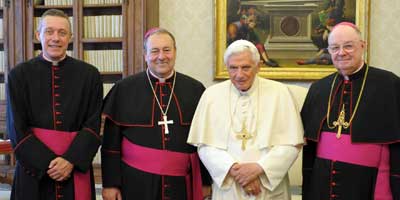
 The phrase “ad limina apostolorum” is Latin for “to the thresholds of the apostles.” It is a required visit by our current apostles to the tombs of the saints in Rome who have guided and inspired them.
The phrase “ad limina apostolorum” is Latin for “to the thresholds of the apostles.” It is a required visit by our current apostles to the tombs of the saints in Rome who have guided and inspired them.
Bishop Robert E. Guglielmone made his first “ad limina” visit in May, along with Bishop Emeritus David B. Thompson, Msgr. Richard D. Harris, Atlanta Archbishop Wilton D. Gregory and other bishops from Georgia, North Carolina and Florida.
It was a strengthening experience, Bishop Guglielmone said, and he came back feeling renewed and refreshed.
“Just praying with the Holy Father was a wonderful opportunity,” he said.
The pilgrimage is primarily of a spiritual nature, with church leaders celebrating Mass at each of the papal basilicas, Bishop Guglielmone explained.
The basilicas include those of St. Peter, St. John Lateran, St. Mary Major and St. Paul Outside the Walls. The group was also scheduled to celebrate Mass at the tomb of Blessed John Paul II, but ended up at the tomb of Blessed St. John XXIII.
“It was kind of nice for me, because I’ve always held John the 23rd in great respect,” Bishop Guglielmone said.
He explained that he admired the pope for bringing a human side to the papacy with smiles and visits to those in need, plus calling for Vatican II.
The regional leaders also met with Pope Benedict XVI to discuss a central theme and with various Vatican officials on issues of common concern.
“The meeting with the Holy Father was very positive,” Bishop Guglielmone said, adding that the pope was interested and engaged in their theme of using new technology for evangelization, while also being aware of potential dangers and instituting measures to protect children.
Prior to their visit, the bishops sent reports to the Vatican on issues relevant to the regional dioceses. Bishop Guglielmone said they discussed many of these topics with Vatican officials, with suggestions on how the Vatican can help and constructive feedback from papal officials.
Topics included in the Vatican report
- Education, especially the difficulty of financing Catholic schools, and the need to have seminarians in one seminary. The bishop said the Vatican approved of using one seminary.
- Immigration and the dichotomy between meeting the needs of immigrants on a Christian level and respecting laws.
- Ecumenism, with a focus on how to collaborate with those who may not agree with Catholic moral positions. Bishop Guglielmone said they have to work together on issues they agree on to make the world a better place, and avoid the others.
- Formation of priests, because there is so much for them to learn now, the bishop said it is essential they don’t lose sight thatthe core of formation is a relationship with Christ.
- Family life and how parishes can strengthen what seems to be a disintegrating tradition. In the South, traditional values are still very much a part of life, the bishop said, but in other areas it is changing and many couples are opting not to havechildren.
On a personal level, the bishop said he enjoyed being with the other bishops of the region and getting his “Italian food fixes” — especially pasta carbonara.
Inspired by the early Christians
Although he didn’t attend meetings with the Vatican officials, Msgr. Harris participated fully in the spiritual aspect of the pilgrimage and came away with a profound sense of unity.
Nothing could overshadow the audience with Pope Benedict XVI, he said, and celebrating Masses at the basilicas was the spiritual highlight.
“Mass at the tomb of St. Peter, our first pope, surrounded by the tombs of his successors who had all probably celebrated Mass during their pontificate at the same location was humbling and inspiring. I was made more aware of the unity within the church between the bishops and the Holy Father, and of the almost seamless connection we all have with those first apostles and disciples,” Msgr. Harris said.
“The celebration of Mass with the bishops of our region at the major basilicas, in particular the tomb of St. Paul, led me to appreciate the call of all Catholics to do all we can to promote and evangelize the faith.
“I returned with a new spiritual vigor and appreciation for the gift of the Church, and even a new insight into the intricate workings and presence of the Holy Spirit in guiding the Church in living the ministry of Jesus Christ.”
He noted that in Rome, there is an immediate connection to Christians centuries ago.
“To realize the sacrifice those early Christians made for the faith should cause us to stop and pause when we find ourselves taking our faith for granted,” he said. “It gives us all a greater appreciation for who we are as Catholics.”
